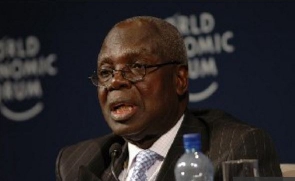 Mr Ishmael Yamson, the Board Chairman of Standard Chartered Bank Ghana
Mr Ishmael Yamson, the Board Chairman of Standard Chartered Bank Ghana
Mr Ishmael Yamson, the Board Chairman of Standard Chartered Bank Ghana, says the banking environment is riskier today than it was some years back because of economic uncertainty and volatility.
The uncertainty, he said, is affecting the profitability of the banks.
Mr Yamson, who was speaking at the bank’s 120th anniversary public lecture held in Accra, said besides the uncertainty increasing competition in the banking industry and provision of financial services by technology companies also pose major risks to the industry.
The lecture, held on the theme: “120 years of Commercial Banking in Ghana: What next?” sought to share thoughts and perspectives on various programmes implemented to develop the nation’s financial sector and more significantly, the banking industry.
Being the oldest and first commercial bank in Ghana, and having served as the Central Bank until 1953, Standard Chartered Bank has been at the forefront of banking and economic evolution in Ghana, hence the decision for the forum to reflect on the moments.
He said increasing customer sophistication and demand for value-added services had necessitated the need for the banks to respond adequately to the speed, capability and infrastructural capacity would allow.
“Customers no longer want a physical bank to transact business because they have limited time. How fast has the banks digitised and how fast have they used technology to bring back pleasurable experience? These will be the key success factors in the short to medium term.”
Mr Kweku Bedu Addo, Managing Director of Standard Chartered Bank Ghana, said the right policy frameworks that provide a level of certainty to investors would engender growth in the banking industry.
But for now, there appears to be some misalignment between policy intentions and the real sector outcomes and these needed to be addressed.
“In effect, there has been at least three periods of austere economic policies over the last four decades, which sometimes makes one asks the question: whether the institutional arrangements are robust enough to keep Ghana on a sustained path of growth, investment and reduced inequality,” Mr. Bedu-Addo said.
“For the respective sector value chains to be better organised to attract private investment, it requires critical and strategic planning, broad consultation with stakeholders and good execution to solve the problem.”
Dr Kwesi Botchwey, Chairman of the National Development Planning Commission, who was the keynote speaker, said the country had not learnt lessons from the austere economic environment some years back.
He said so many years after the country went through a programme with the IMF, we are back on the same path implementing same programmes to stabilise the economy through home-grown policies.